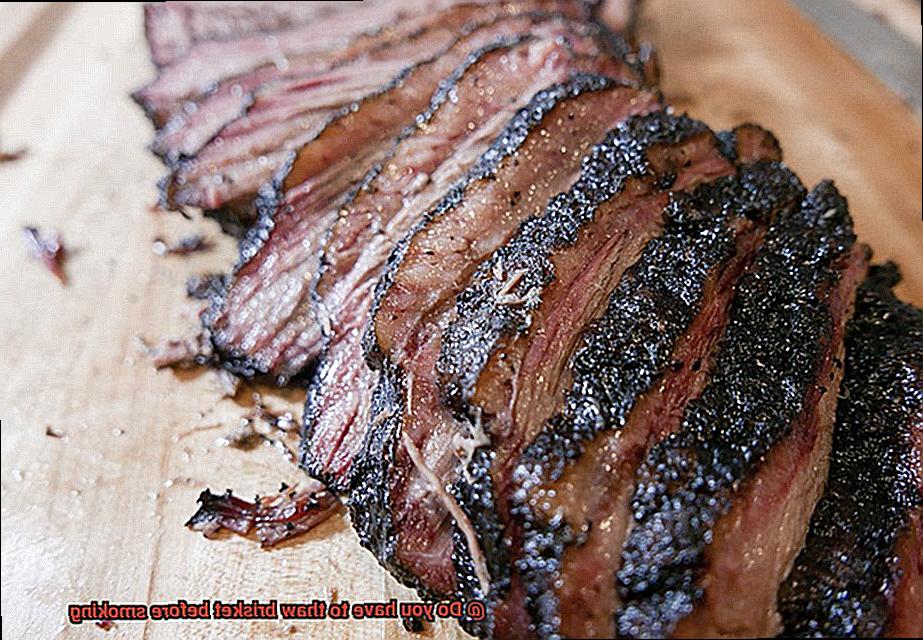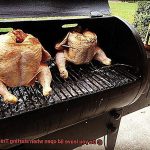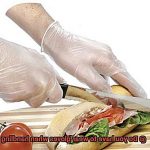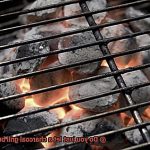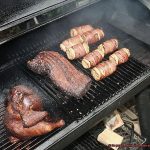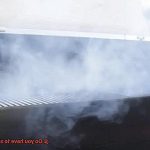Picture this: a juicy, mouthwatering brisket, perfectly smoked to perfection. It’s the stuff meat lover’s dreams are made of. But before you can achieve that culinary masterpiece, there’s an important step you need to take – thawing your brisket.
As a seasoned pitmaster or newbie smoker, you know that proper meat preparation is key to achieving the best results. And one question that often comes up for those new to smoking brisket is whether or not it needs to be thawed before cooking.
The answer is a resounding yes. Thawing your brisket before smoking is crucial in ensuring even cooking, maximum flavor and minimizing the risk of bacterial contamination. Trying to smoke a frozen brisket can lead to frustration with uneven cooking and extended cook times.
In this article, we’ll dive into why thawing your brisket before smoking is so important and provide some tips on how to properly defrost your meat. We’ll also share some pro-tips on how to take your brisket smoking game up a notch.
Whether you’re looking to impress at your next BBQ or just want to enjoy some deliciously smoked meat at home, keep reading for everything you need to know about thawing brisket before smoking.
Contents
What Happens to Frozen Brisket?
Before you do, it’s important to understand what happens when you smoke a frozen brisket. Let’s explore the effects of smoking a brisket straight from the freezer.
First and foremost, smoking a frozen brisket takes significantly longer to cook than a thawed one. The heat has to first penetrate through the frozen meat before it can start to cook the brisket itself. As a result, you’ll need to plan on adding several hours to your cooking time if you’re working with a frozen brisket. This can be frustrating for those eager to get their BBQ fix, but patience is key in achieving mouth-watering results.
But that’s not all. Smoking a frozen brisket can also lead to uneven cooking, resulting in some areas being overcooked while others remain undercooked. This can leave you with tough, dry meat that’s unappetizing and difficult to chew. No one wants to serve their guests an unsatisfactory meal, so it’s best to avoid this potential pitfall altogether.
Another thing to keep in mind is that freezing a brisket can cause it to lose some of its flavor and texture. While this may not be noticeable to everyone, for those seeking the ultimate BBQ experience, thawing is essential. Thawing your brisket before smoking allows for the meat to retain its moisture and flavor, ensuring you’re serving up the best possible product.
So, what’s the solution? Thawing your brisket before smoking is the best way to ensure even cooking and optimal flavor. There are several methods for thawing a brisket, including thawing it in the refrigerator, using a cold-water bath, or using a microwave. It’s important to follow proper food safety guidelines when thawing your brisket, as leaving it out at room temperature for too long can allow bacteria to grow.
Why Thawing is Necessary
Before you fire up your smoker and throw on that hunk of frozen meat, remember that thawing your brisket is not just a suggestion, it’s a necessity. Here’s why:
- Moisture is the key: Frozen meat can cause ice crystals to form inside the muscle fibers, leading to expansion and rupture, which results in a loss of moisture and flavor while cooking. Thawing allows the ice crystals to melt and the muscle fibers to relax, ensuring a more tender and juicy final product.
- Even cooking: Smoking frozen meat can lead to uneven cooking, with the outer layer cooked quickly and the inside remaining frozen, resulting in an unappetizing disaster. Thawing your brisket ensures even cooking throughout the meat and guarantees that it reaches a safe internal temperature.
But thawing should be done correctly to ensure food safety. Brisket should be thawed in the refrigerator or in cold water, avoiding room temperature, which can lead to bacterial growth. Safe handling practices like washing hands and utensils thoroughly are essential when thawing and cooking meat to prevent cross-contamination with other foods.
Different Methods of Thawing a Brisket
As a true barbecue aficionado, you know that the key to a perfect brisket is in the details. One of the most critical steps is thawing your meat before smoking it, and luckily, there are several methods you can use to achieve this.
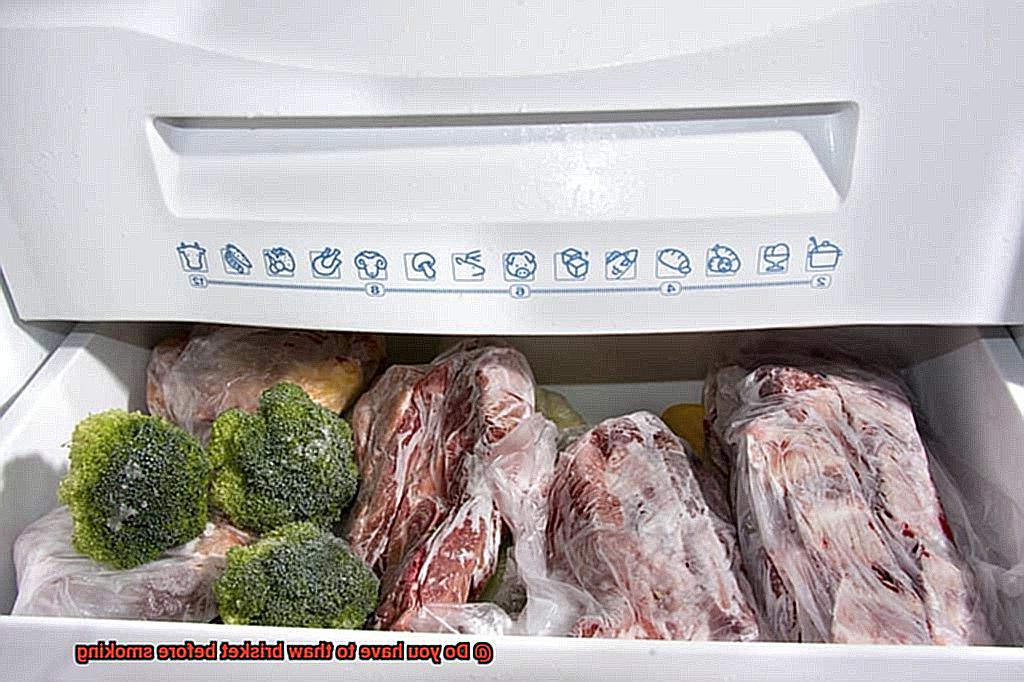
The refrigerator method is the gold standard for thawing brisket. It’s safe, effective, and ensures even thawing of your meat. Simply place your frozen brisket in a dish or pan and let it sit in the fridge for 24-48 hours, depending on its size. This slow thawing process guarantees that your meat stays at a safe temperature and prevents any bacteria from multiplying.
If you’re short on time, the cold water method can be a lifesaver. Put your frozen brisket in a leak-proof plastic bag and submerge it in cold water. Don’t forget to change the water every half an hour to keep it cold and prevent bacteria from forming. However, this method should only be used if you plan to cook your brisket immediately after thawing.
But what if you’re really in a hurry? Enter the microwave method – but with caution. This method can be tricky because it can lead to uneven thawing and cooking of your brisket. Follow your microwave’s instructions carefully, use the defrost setting, and be prepared to finish thawing your meat using another method.
In summary, planning ahead is essential when it comes to thawing your brisket. Don’t rush it – take time to thaw it properly using one of these methods, and you’ll be rewarded with tender, juicy meat that’s sure to impress. And remember, always handle your meat with care and follow safe handling practices to prevent cross-contamination with other foods.
To recap, here’s a quick list of the different methods for thawing a brisket:
- Refrigerator method – safest and most effective
- Cold water method – quicker but should only be used if cooking immediately
- Microwave method – use with caution and as a last resort
How Long Does it Take to Thaw a Brisket?
If you’re planning to smoke a brisket, it’s important to know how long it takes to thaw it properly. After all, the key to a delicious, juicy brisket lies in the thawing process. Here’s everything you need to know about how long it takes to thaw a brisket.
First and foremost, let’s consider the size of your brisket. The larger the cut of meat, the longer it will take to thaw. The most reliable method is thawing in the refrigerator, which is also the safest option. Plan for at least 24 hours of thawing time for every five pounds of meat. So if you’re dealing with a 10-pound brisket, you’ll need to set aside approximately 48 hours or two days for it to defrost completely in the fridge.
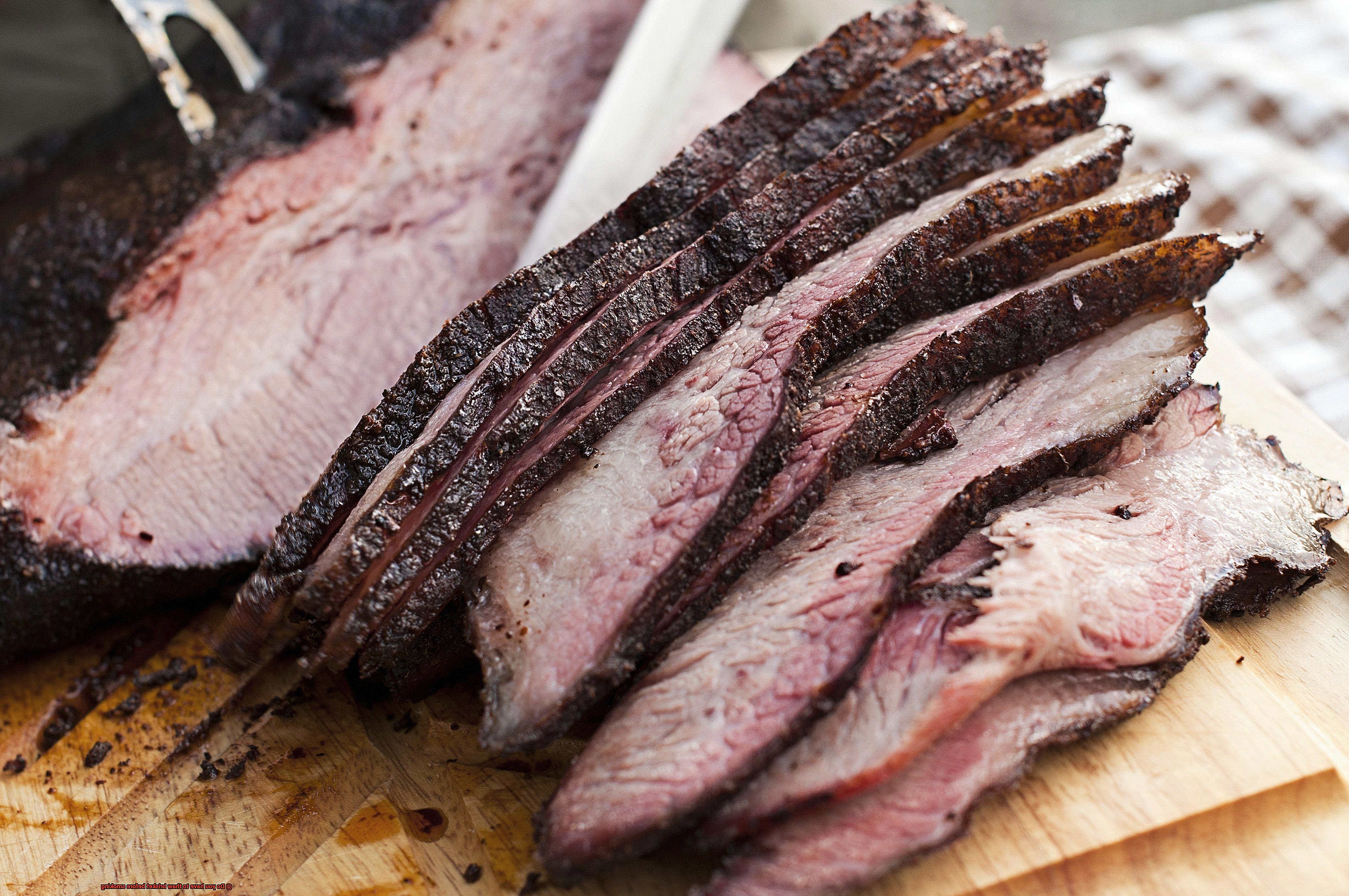
But what if you’re short on time? Fear not. The cold water method is a great alternative, but it requires more attention than thawing in the refrigerator. To use this method, place your brisket in a leak-proof plastic bag and submerge it in cold water. Change the water every 30 minutes and allow for at least 30 minutes of thawing time per pound of meat. So if you’re dealing with a 10-pound brisket, expect it to take around five hours to defrost using this method.
It’s crucial to note that quick-thawing methods like microwaving or leaving your meat at room temperature can lead to bacterial growth and an increased risk of foodborne illness. Always use safe thawing methods like the refrigerator or cold water methods.
Food Safety Guidelines for Properly Thawing Meat
As a meat smoker, you understand the importance of food safety when it comes to cooking your favorite cut. One crucial step that can make or break your smoking experience is proper thawing. Thawing meat correctly ensures that it is cooked evenly and at a safe temperature, reducing the risk of foodborne illness. Here are some guidelines to help you properly thaw your brisket before smoking.
First and foremost, plan ahead. Never thaw your meat at room temperature as it can promote the growth of harmful bacteria. Instead, thaw your brisket in the refrigerator or in cold water. While thawing in the fridge is the safest method, it can take several days depending on the size of your cut of meat. If you’re crunched for time, use the cold water method but be prepared to give it more attention.
To thaw using the cold water method, place your brisket in a leak-proof plastic bag and submerge it in cold water. Change the water every 30 minutes to ensure that it stays cold throughout the thawing process. Keep in mind that this method still requires several hours of thawing time, so plan accordingly.
Avoid shortcuts when it comes to thawing your brisket. Never use hot water or a microwave as this can cause uneven thawing and potentially cook parts of the meat before others are fully thawed. Also, if you plan on marinating your brisket before smoking, be sure to do so in the refrigerator and not at room temperature.
Advantages of Thawing a Brisket Before Smoking
As a connoisseur of smoked meats, I can confidently declare that proper thawing of your brisket is a crucial step in achieving unparalleled flavor and texture. Thawing your brisket before smoking it offers a plethora of advantages that elevate the quality and safety of your end product.
Firstly, thawing ensures even cooking throughout the brisket. Frozen meat has dense outer layers that prevent heat from penetrating uniformly, leading to dry and tough briskets. Thawing allows for consistent cooking, resulting in a tender and juicy masterpiece.
Moreover, thawing reduces cooking time. A frozen brisket takes significantly longer to cook as it needs to thaw first. By thawing beforehand, you not only save time but also ensure an efficient cooking process.
Thawing also allows for better seasoning absorption. Frozen meat forms ice crystals inside, preventing seasoning from penetrating deeply. With proper thawing, the seasoning can fully absorb into the meat, enhancing its flavor profile.
Most importantly, thawing helps prevent foodborne illness. While bacteria may be dormant when meat is frozen, they become active when thawed and can multiply quickly if not cooked properly. Correctly thawing your brisket ensures proper cooking and safe consumption.
Disadvantages of Not Thawing a Brisket Before Smoking
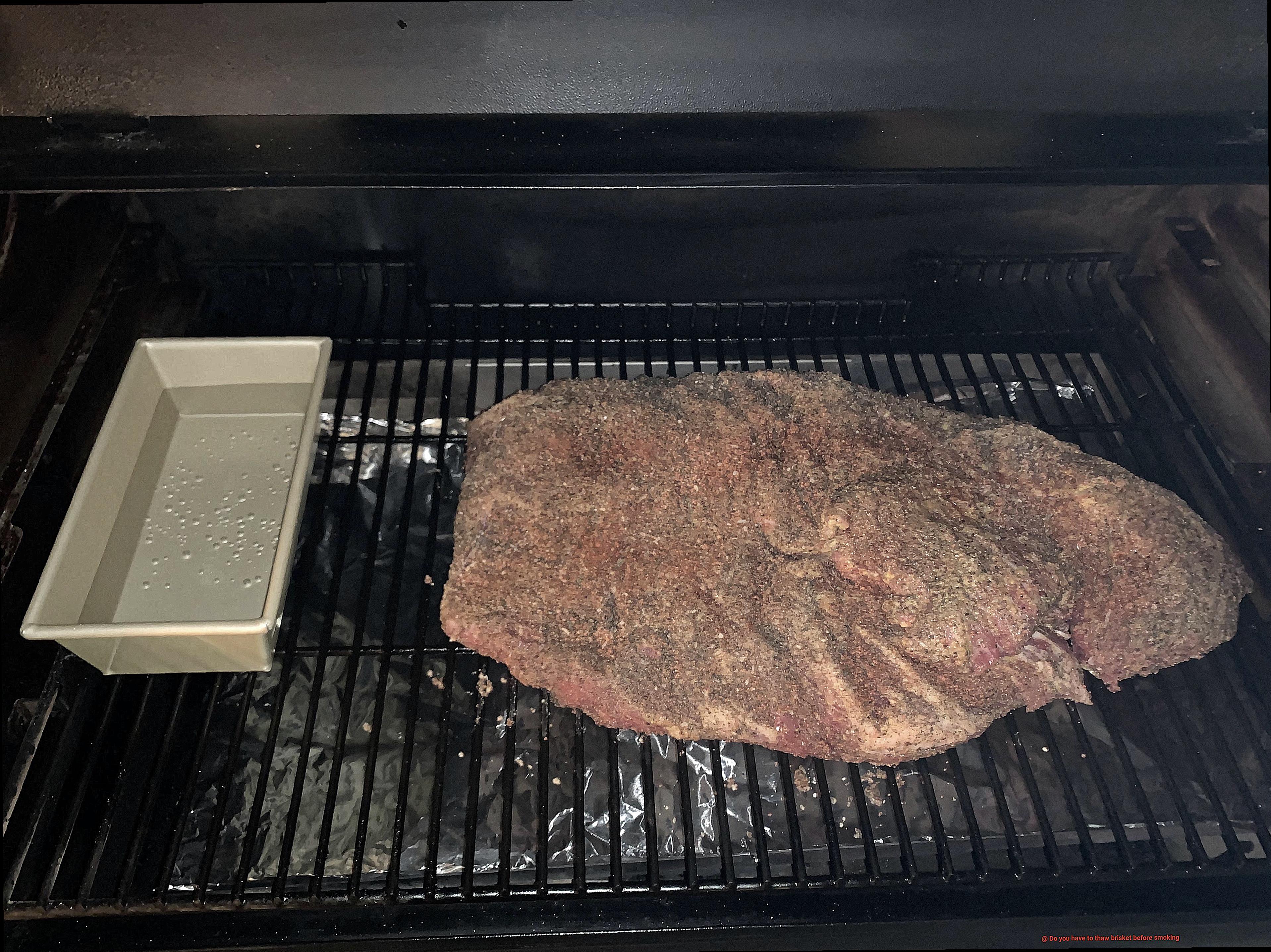
It may seem like a time-saver to throw a frozen slab of meat onto your smoker, but the disadvantages far outweigh any potential benefits.
For starters, not thawing your brisket can result in uneven cooking, where the outer layers cook faster than the frozen interior. This creates a tough and chewy texture that no one wants to sink their teeth into. Moreover, a frozen brisket requires extended cooking time, which can lead to moisture loss and leave you with dry, flavorless meat. Who wants that?
However, the risks don’t end there. Not thawing your brisket also increases the risk of foodborne illness. When meat is frozen, any harmful bacteria present become dormant. But when you cook from frozen, those bacteria awaken and start to multiply in the warm environment of your smoker. This poses a serious health hazard that you’d want to avoid at all costs.
So what’s the solution? Thaw your brisket properly before smoking it. Not only will this ensure even cooking and reduce cooking time, but it will also allow for better seasoning absorption. Plus, thawing your meat eliminates any potential food safety concerns.
ZT3m4xV34V0″ >
Conclusion
In conclusion, thawing your brisket before smoking is a vital step in achieving the perfect smoked meat. Smoking a frozen brisket can result in uneven cooking, extended cook times, and loss of flavor and texture. Thawing allows for even cooking, maximum flavor, and minimizes the risk of bacterial contamination. Proper meat preparation is key to achieving mouth-watering results that will leave your taste buds dancing.
When it comes to thawing your brisket, there are several methods to choose from. The refrigerator method is the safest and most effective but takes longer. On the other hand, the cold water method requires more attention but is quicker. The microwave method should only be used as a last resort.
It’s crucial to follow food safety guidelines when thawing your brisket to prevent cross-contamination with other foods and bacterial growth. Safe handling practices like washing hands and utensils thoroughly are necessary.
Thawing your brisket before smoking offers several advantages like even cooking, reduced cooking time, better seasoning absorption, and prevention of foodborne illness. Not thawing your brisket increases risks like uneven cooking, extended cook times, loss of flavor and texture, and foodborne illness.
In summary, take the time to thaw your brisket properly using safe methods for mouth-watering results that will impress at your next BBQ or provide you with deliciously smoked meat at home.

